For many years, herbal teas made from the leaves, flowers, and roots of the mullein plant (Verbascum thapsus) have been celebrated for their numerous health benefits. Mullein Tea Recipe is particularly valued for its positive effects on the respiratory system. It helps the body with mucus secretion, relieves coughing, and soothes irritated throats, making it an excellent herbal treatment for colds and flu cases. Mullein tea is also admired for its calming, anti-inflammatory effects, which contribute to relaxation and healing.
Mullein tea is also good for the digestive system, helps with pain, and improves the quality of sleep. This simple herbal drink is so easy to make and refreshing to drink; you can have it hot or iced at any time of the day. Mullein tea is a perfect choice if you want a simple, herbal home remedy to help improve your health. The lovely old-world taste of mullein tea promotes relaxation and healing of the body. This tea is gentle and effective, and you will be glad you tried it.
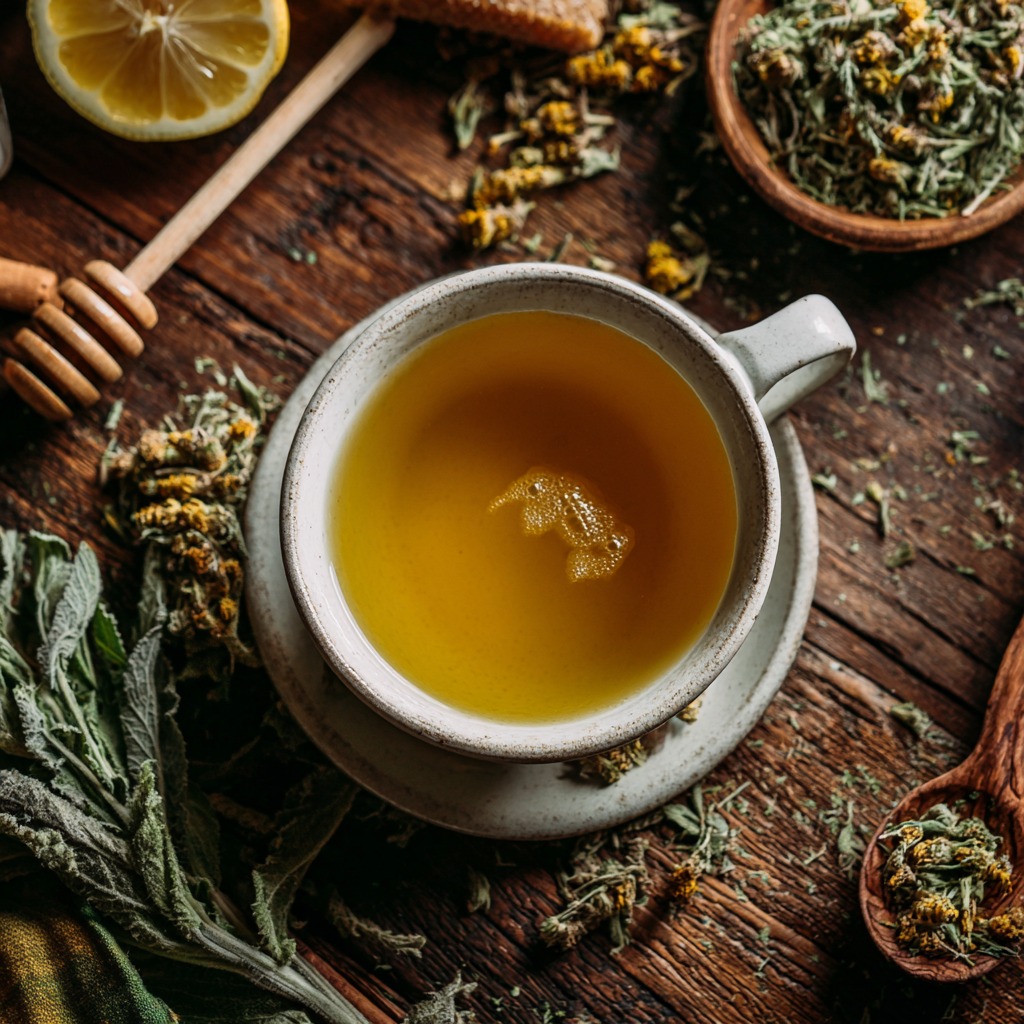
- What is Mullein Tea and Why Should You Drink It?
- The Health Benefits of Mullein Tea
- Mullein Tea Recipe: Step-by-Step Guide
- Different Variations of Mullein Tea Recipes
- How to Choose the Best Mullein for Tea
- Potential Side Effects of Mullein Tea
- How to Incorporate Mullein Tea into Your Daily Routine
- Frequently Asked Questions About Mullein Tea
- Conclusion: Why Mullein Tea Should Be a Part of Your Herbal Routine
What is Mullein Tea and Why Should You Drink It?
Mullein Tea. Mullein Tea, made using the leaves, flowers, and roots of the plant, Verbascum thapsus, has been popular in folk medicine. With tall, fuzzy leaves and bright yellow flowers, mullein has been documented since ancient times, and mullein tea is used to treat respiratory issues and can be soothing.
Mullein tea is helpful in soothing coughs and in treating inflammations in the body. Mullein is primarily popular for treating respiratory issues, relaxing, and has anti-inflammatory and digestive properties.
Due to its versatility, natural healing properties, and wellness-promoting abilities. Mullein tea has become popular. How to prepare mullein tea.
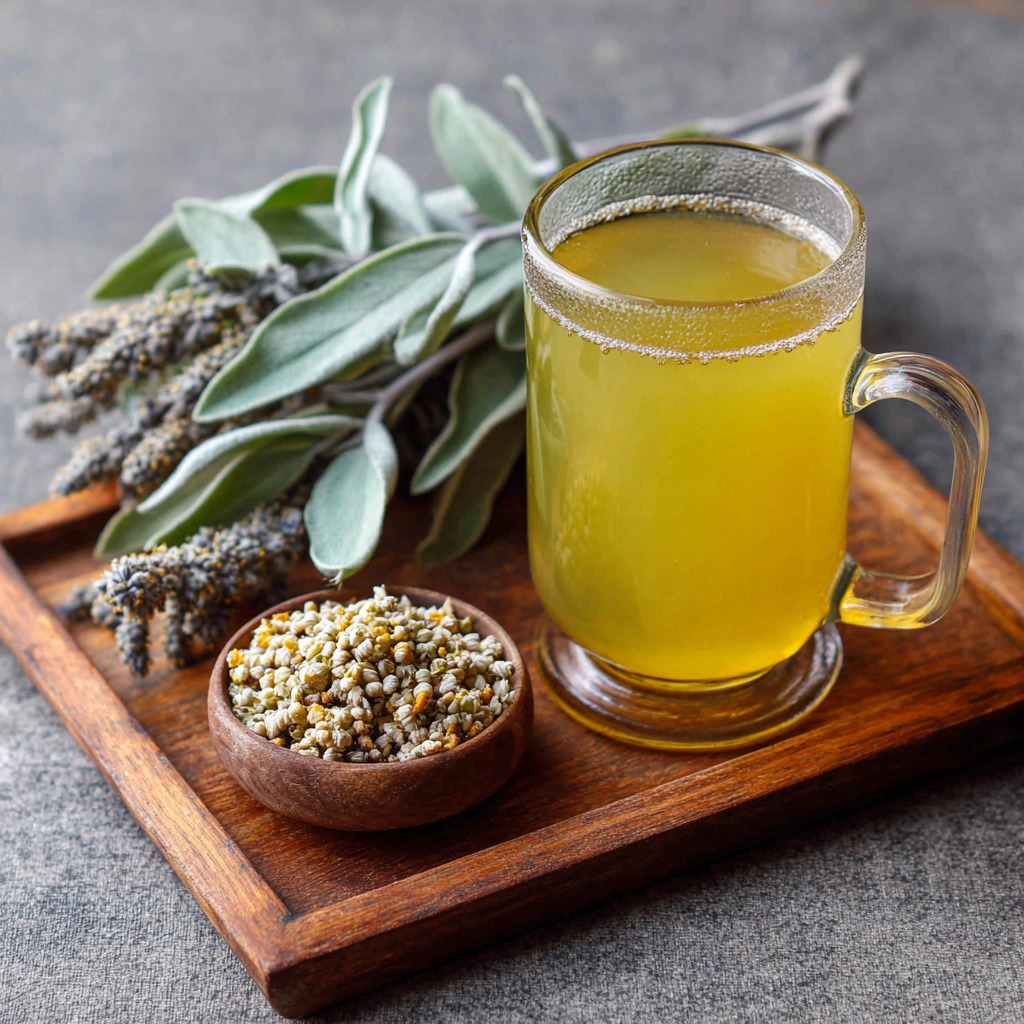
The Health Benefits of Mullein Tea
There’s more to mullein tea than its calming effects. It also has a variety of health-boosting properties, so it’s likely worth ditching your other herbal teas. Here are some of the advantages. Supports Respiratory Health
Supports Respiratory Health
Vocal Health. One of the most popular and recognized benefits of mullein tea is its ability to prevent respiratory infections. Mullein leaves and flowers are thought to help relieve respiratory issues because of their expectorant qualities, which help break up congestion in airways, allowing you to breathe better. It is perfect for those who have a cold, the flu, coughing, and asthma.
- Helps clear mucus: Mullein tea can help loosen mucus in the lungs and ease coughing, promoting smoother breathing.
- Soothes irritation: If you have a sore throat or irritated airways, mullein tea can provide a soothing effect, relieving discomfort.
Reduces Inflammation and Pain
Mullein tea has anti-inflammatory properties that can benefit people dealing with chronic pain, such as joint or muscle inflammation. Drinking this tea regularly may help reduce inflammation and ease associated pain, making it an ideal herbal remedy for those suffering from conditions like arthritis.
- Relieves muscle pain: Mullein tea can help alleviate muscle soreness or pain, especially when combined with other anti-inflammatory herbs.
- Reduces swelling: The anti-inflammatory effects of mullein tea help reduce swelling in the body, providing natural relief.
Supports Digestive Health
Mullein tea also has benefits for the digestive system. It can help soothe the stomach and intestines, easing symptoms of indigestion, constipation, and bloating.
- Soothes the digestive tract: Mullein tea may help relax the stomach muscles, promoting smoother digestion.
- Relieves constipation: It can have a mild laxative effect, which helps ease constipation when consumed in moderation.
Aids Sleep and Relaxation
The calming properties of mullein tea make it an excellent choice for those struggling with sleep issues. The tea can help reduce anxiety, calm the nervous system, and promote a restful night’s sleep.
Improves sleep quality: Drinking mullein tea before bedtime can promote more profound and restful sleep.
Reduces stress: Mullein tea may help reduce anxiety and mental tension, making it easier to relax.
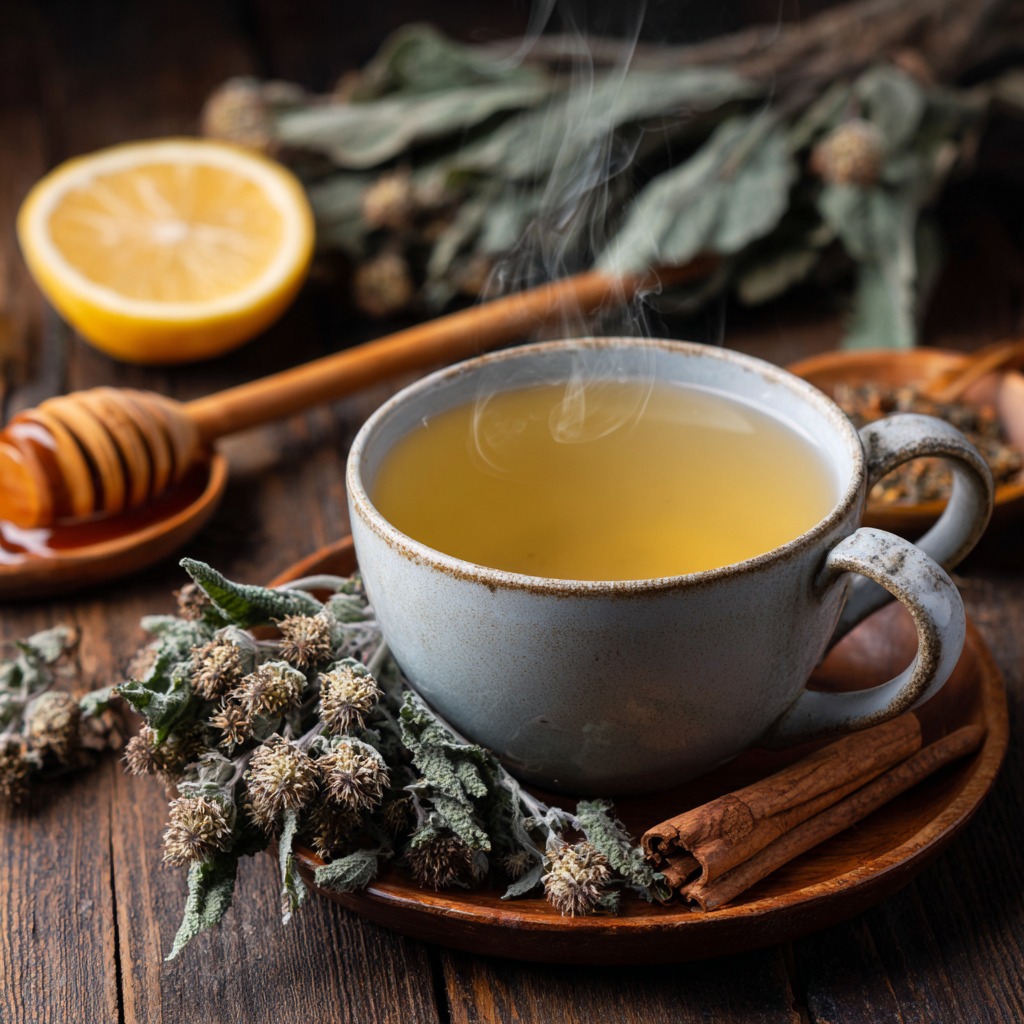
Mullein Tea Recipe: Step-by-Step Guide
Ready to make mullein tea at home? Follow this simple mullein tea recipe to prepare a cup of this soothing herbal drink.
Ingredients Needed for the Perfect Mullein Tea
- Fresh or dried mullein leaves (1 tablespoon for one cup of tea)
- Water (1 cup)
- Optional: honey, lemon, cinnamon, or ginger for added flavor
How to Make Mullein Tea: Simple Recipe
Serve and enjoy: Add honey, lemon, or cinnamon to taste. Drink your warm mullein tea and enjoy its calming effects.
Boil water: Bring a cup of water to a rolling boil in a saucepan or kettle.
Add mullein leaves: Place one tablespoon of dried or fresh mullein leaves into a teapot or directly into your cup.
Steep the tea: Pour the hot water over the mullein leaves and let it steep for 5-10 minutes. The longer you let it steep, the stronger the flavor will be.
Strain the tea: After steeping, strain out the mullein leaves using a fine mesh strainer. You can also use a tea infuser for easy straining.
How Much Mullein Tea Should You Drink Daily?
For optimal results, it’s best to drink 1-2 cups of mullein tea daily. If you’re using it for respiratory health, drink it regularly to help clear mucus. For digestive health or relaxation, a cup in the evening may be particularly beneficial.
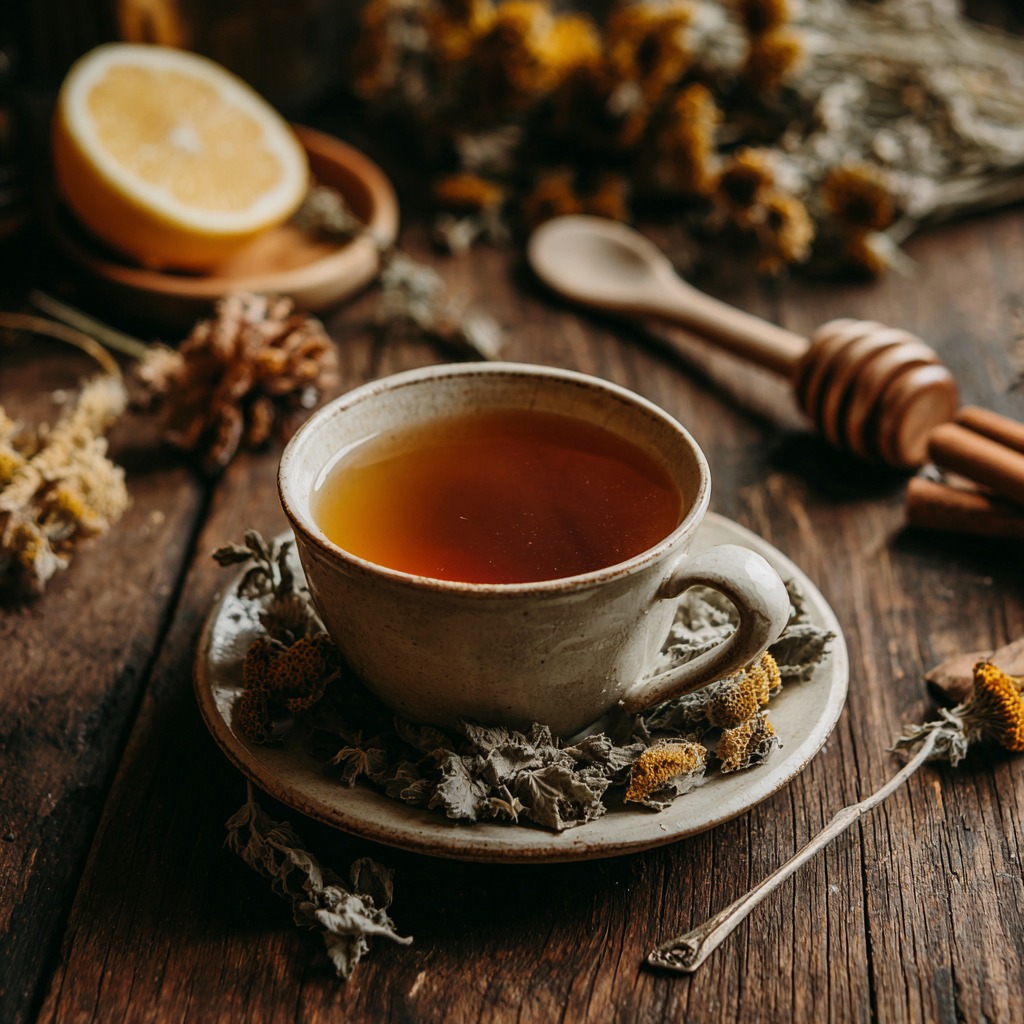
Different Variations of Mullein Tea Recipes
While the classic mullein tea recipe is fantastic on its own, there are a few variations that can elevate the flavor and enhance the health benefits.
Mullein Tea with Honey and Lemon
Honey and lemon both have soothing properties, making them the perfect additions to mullein tea. Honey helps coat the throat, while lemon adds a refreshing, tangy flavor that also supports the immune system.
- Recipe: Add a teaspoon of honey and a slice of lemon to your cup of mullein tea. Stir and enjoy!
Mullei n and Ginger Tea
Ginger is known for its anti-inflammatory and digestive benefits. When combined with mullein tea, it creates a powerhouse of healing properties that can help with inflammation and digestion.
- Recipe: Add a few slices of fresh ginger to your mullein tea while it steeps. Remove the ginger before drinking.
Mullein Tea with Cinnamon
Cinnamon adds a warming and comforting flavor to mullein tea while also providing additional anti-inflammatory benefits.
- Recipe: Drop a cinnamon stick into the tea while it’s steeping or add ground cinnamon to taste.
Iced Mullein Tea Recipe
In warmer months, you can make iced mullein tea for a refreshing drink.
Recipe: Brew a strong batch of mullein tea, allow it to cool, and pour it over ice. Add lemon, honey, or mint for extra flavor.
How to Choose the Best Mullein for Tea
When selecting mullein for your tea, it’s essential to know how to pick the right type and where to find it.
Fresh vs. Dried Mullein Leaves
- Fresh mullein leaves can be picked directly from the plant if you grow it yourself. They provide the freshest flavor but must be used promptly.
- Dried mullein leaves are more commonly used for tea, and they have a longer shelf life. You can buy them at most health food stores or online.
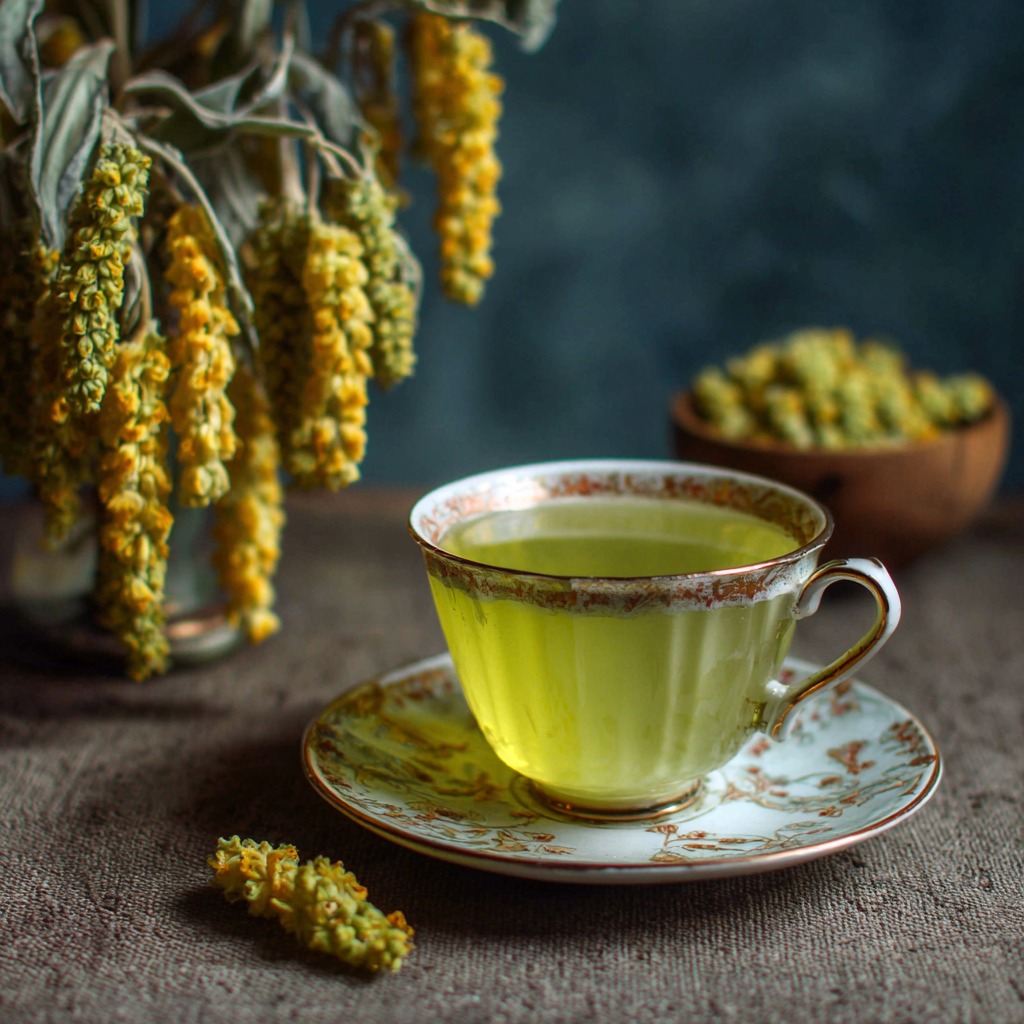
Where to Find Mullein for Tea
- Herbal stores: Local herbal shops often carry dried mullein.
- Online retailers: Trusted online shops like Amazon or specialized herbal suppliers offer mullein leaves.
- Foraging: If you live in areas where mullein grows, you can forage for fresh leaves, but make sure to identify the plant and avoid polluted areas properly.
Organic Mullein: Is It Better?
While organic mullein is not always necessary, it’s best to choose it if available. Organic mullein ensures you’re consuming a product free from pesticides and chemicals, making it a healthier option.
Potential Side Effects of Mullein Tea
Although mullein tea is generally safe for most people, there are a few things to consider before making it a regular part of your routine.
Pregnancy and breastfeeding: Always consult with a healthcare provider before drinking mullein tea if you are pregnant or breastfeeding, as safety during these times is not fully established.
Allergic reactions: Some people may be allergic to mullein. If you experience itching, swelling, or difficulty breathing after drinking it, discontinue use immediately and consult a doctor.
How to Incorporate Mullein Tea into Your Daily Routine
To experience the full benefits of mullein tea, consider incorporating it into your daily routine.
Best Times to Drink Mullein Tea
Evening: Enjoy a cup of mullein tea before bed for relaxation and improved sleep.
Morning: Drink it after breakfast for digestive support.
Frequently Asked Questions About Mullein Tea
Can Mullein Tea Help with Coughing?
Yes, mullein tea’s expectorant properties help clear mucus, making it a natural remedy for coughs and respiratory congestion.
Is Mullein Tea Good for Weight Loss?
While mullein tea isn’t a direct weight-loss solution, its ability to support digestion and reduce inflammation may indirectly help those trying to lose weight.
Can You Drink Mullein Tea Every Day?
Yes, you can drink mullein tea daily, but it’s important to consume it in moderation. Drinking 1-2 cups per day is considered safe for most people.
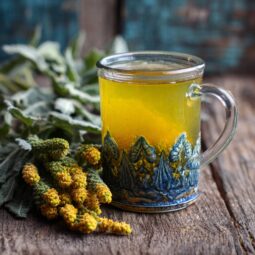
Mullein Tea Recipe
Equipment
- Teapot or heat-resistant container
- Fine mesh strainer or tea infuser
- Kettle or saucepan
- Measuring spoons
Ingredients
- 1 tablespoon dried or fresh mullein leaves or 2 teaspoons of dried mullein flowers
- 1 cup of water
- Optional:
- 1 teaspoon honey for sweetness
- 1-2 slices lemon for added flavor
- 1-2 slices fresh ginger for an anti-inflammatory boost
- 1 cinnamon stick for a warming touch
Instructions
- Boil the water: Bring 1 cup of water to a rolling boil using a kettle or saucepan.
- Prepare mullein: Place 1 tablespoon of dried or fresh mullein leaves into your teapot or a heat-resistant container.
- Steep the tea: Pour the hot water over the mullein leaves. Allow the tea to steep for 5-10 minutes, depending on how strong you prefer the flavor.
- Strain the tea: After steeping, use a fine mesh strainer or tea infuser to strain out the mullein leaves from the tea.
- Serve and enjoy: Optionally, add honey, lemon, or ginger to your tea for extra flavor. Stir and enjoy the soothing, calming effects of mullein tea.
Notes
- How to store: If you make extra tea, store it in the refrigerator for up to 2-3 days. Simply reheat before serving or serve over ice for a refreshing iced version.
- Organic mullein: Whenever possible, opt for organic mullein leaves to avoid pesticides.
- Dosage: Drink 1-2 cups daily for health benefits. If you are using mullein tea for respiratory issues, it may be beneficial to drink it regularly.
- Allergies: If you have any known allergies to plants in the Verbascum family, avoid drinking mullein tea and consult your healthcare provider.
- Pregnancy and breastfeeding: Always consult a healthcare provider before consuming mullein tea during pregnancy or breastfeeding.
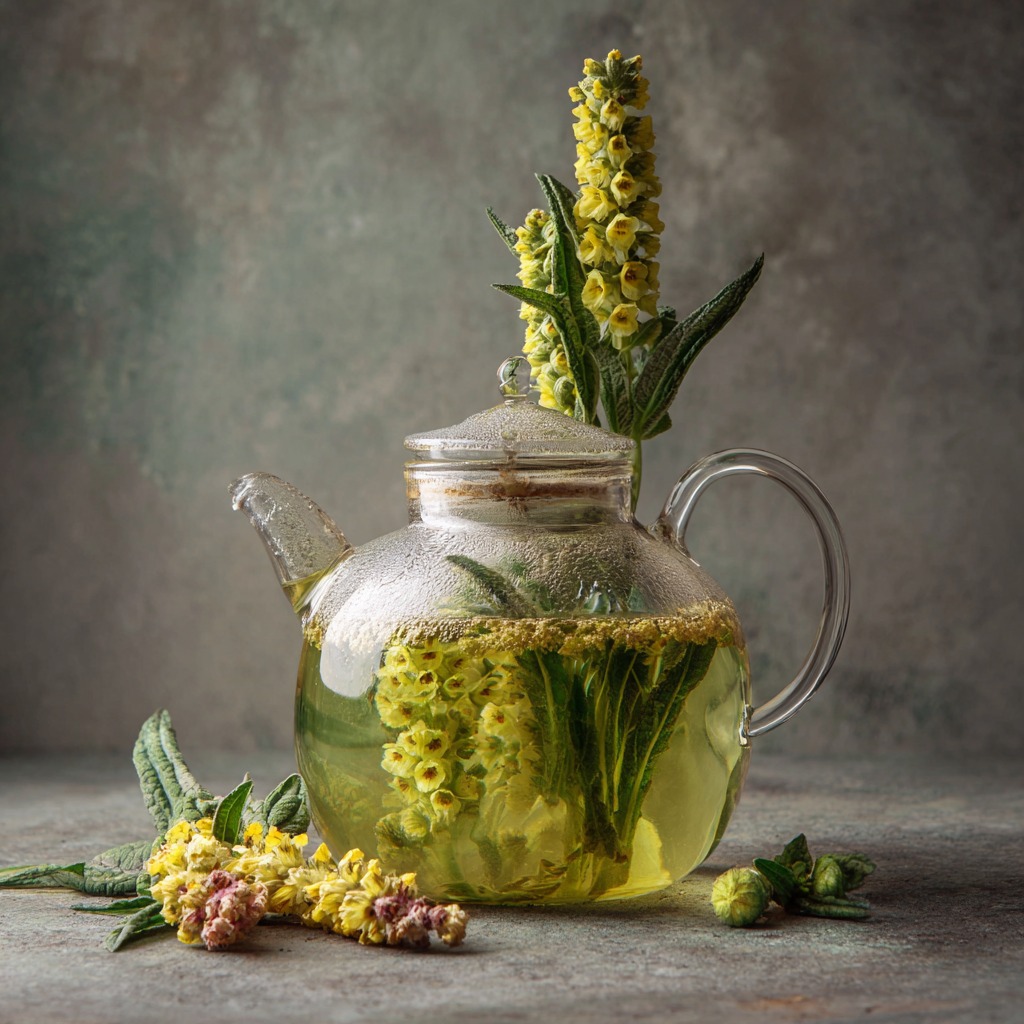
Conclusion: Why Mullein Tea Should Be a Part of Your Herbal Routine
Mullein tea is an incredibly easy-to-prepare drink that has a host of impressive health benefits! With potential benefits for respiratory health and anti-inflammatory properties, this tea is a welcome addition to any wellness program. Whether you like it hot or cold, with honey, lemon, or cinnamon, mullein tea is easy to make and provides a variety of natural health benefits.
So why not give this mullein tea recipe a shot and discover its soothing, healing effects as well?
